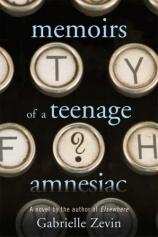Excerpt
Excerpt
Memoirs of a Teenage Amnesiac

1
IF THINGS HAD BEEN DIFFERENT, I’D BE CALLED
Nataliya or Natasha, and I’d have a Russian accent and chapped lips year round. Maybe I’d even be a street kid who’d trade you just about anything for a pair of blue jeans. But I am not Nataliya or Natasha, because at six months old I was delivered from Kratovo, Moscow Oblast, to Brooklyn, New York. I don’t remember the trip or ever having lived in Russia at all. What I know about my orphanhood is limited to what I’ve been told by my parents and then by what they were told, which was sketchy at best: a week-old baby girl was found in an empty typewriter case in the second-to-last pew of an Eastern Orthodox Church. Was the case a clue to my biological father’s pro-fession? Did the church mean my birth mother was devout? I’ll never know, so I choose not to speculate. Besides, I hate orphan stories. They’re all the same, but most books are bursting with them anyway. You start to think everyone in the whole world must be an orphan.
I can’t remember a time when I didn’t know I was adopted. There was never a dramatic “we have something to tell you” talk. My adoption was simply another fact, like having dark hair or no sib-lings. I knew I was adopted even before I knew what that truly meant. Understanding adoption requires a basic understanding of sex, something I would not have until third grade when Gina Papadakis brought her grandparents’ disturbingly dog-eared copy of The Joy of Sex to school. She passed it around at lunch and while most everyone else was gagging with the realization that their parents had done that to make them (so much hair, and the people in the drawings were not one bit joyful…), I felt perfectly fine, even a little smug. I might be adopted, but at least my parents hadn’t degraded themselves like that for my sake.
You’re probably wondering why they didn’t do it the old-fashioned way. Not that it’s any of your business, but they tried for a while without getting anywhere. After about a year, Mom and Dad decided that, rather than invest about a billion dollars on fertility treatments that might not work anyway, it would be better to spend the money helping some sob story like me. This is why you are not, at the very moment, holding in your hands the inspiring true account of a Kratovan orphan called Nataliya, who, things being different, might be named Nancy or Naomi.
Truth is, I rarely think about any of this. I’m only telling you now because, in a way, I was born to be an amnesiac. I have always been required to fill in the blanks.
But I’m definitely getting ahead of myself.
When he heard about my (for lack of a better term) accident, my best friend, Will, who I’d completely forgotten at the time, wrote me a letter. (I didn’t come across it immediately because he had slipped it inside the sleeve of a mix CD.) He had inherited a battered black type-writer from his great-uncle Desmond who’d supposedly been a war correspondent, though Will was unclear which war it had been. There was a dent on the carriage return that Will theorized might be from a ricocheting bullet. In any case, Will liked composing letters on the type-writer, even when it would have been much easier to send an e-mail or call a person on the phone. Incidentally, the boy wasn’t antitechnology; he just had an appreciation for things other people had forgotten.
I should tell you that the following dispatch, while being the only record of the events leading up to my accident, does not really convey much of Will’s personality. It was completely unlike him to be so formal, stiff, boring even. You do get some sense of him from his footnotes, but half of you probably won’t bother with those anyway. I know I didn’t. At the time, I felt about footnotes nearly the same way I did about orphan stories.
Chief:
The first thing you should know about me isthat IU remember everything, and the secondthing is that IU’m probably the most honestperson in the world. IU realize that you can’ttrust anyone who says that they’re honest,and knowing this, IU wouldn’t normally saysomething like that about myself. IU’m onlytelling you now because it’s something IU feelyou should know.
I
Un an attempt to make myself useful to you,
I
U have assembled a timeline of the events
leading up to your accident, which you may or
may not find helpful, but you will find
below.
6:36 p.m. Naomi Porter and William Landsman,
Co-editors of the national-award-winning1
Thomas Purdue Country Day School yearbook,
leave the offices of The Phoenix.2
6:45 p.m. Porter and Landsman arrive at thestudent parking lot. Porter realizes thatthey have left the camera back at the office.
6:46 p.m. Discussion3 ensues regarding who
should have to return to the office to
retrieve the camera. Landsman suggests
settling the matter with a coin toss,4 a
proposition which Porter accepts. Landsman
says that he will be heads, but Porter
states5 that she should be heads. Landsman
concedes, as oft happens. Landsman flips the
coin, and Porter loses.
6:53 p.m. Landsman drives home; Porter
returns to The Phoenix.
7:02 p.m.6 (approx.) Porter arrives at the
Memoirs of a Teenage Amnesiac
- Genres: Fiction
- hardcover: 288 pages
- Publisher: Farrar, Straus and Giroux (BYR)
- ISBN-10: 0374349460
- ISBN-13: 9780374349462








